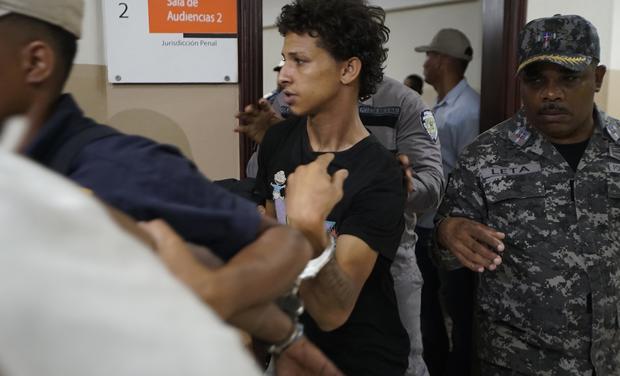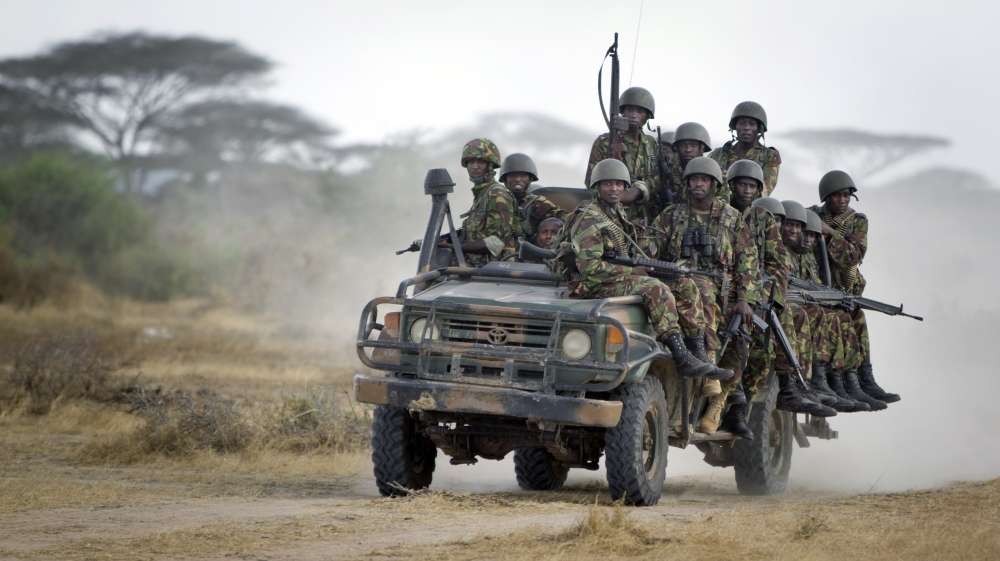One constant in President Trump’s malleable foreign policy has been his fierce criticism of Iran and what he described as a weak and dangerous nuclear compact the United States and other countries negotiated with Iran.
Threats and sanctions, and lots of them, have been his go-to response, lately leavened with vague offers of future negotiations.
Trump’s reaction to attacks on two commercial tankers near the Strait of Hormuz on Thursday fits the pattern, but may also reveal the limits of his administration’s strategy of squeezing Iran’s oil-dependent economy even if it means punishing U.S. allies in the process.
“Iran did do it,” Trump told Fox News on Friday, hours after the U.S. miliary released grainy video footage it says shows a small Iranian ship sidling up to a damaged tanker and crew members removing an unexploded mine from the larger ship’s hull.
“You know they did it because you saw the boat. I guess one of the mines didn’t explode and it’s probably got essentially Iran written all over it,” Trump said.
The tanker incident pushed already rising tensions to a new height, with fears of a deliberate or accidental armed clash between U.S. and Iranian forces as Trump and Iranian supreme leader Ayatollah Ali Khamenei exchanged barbs online.
“I do not see Trump as worthy of any message exchange, and I do not have any reply for him, now or in future,” Khamenei’s website quoted him as saying in response to an offer of dialogue.
The Trump administration has said its goal is to cut off all Iranian oil exports, humbling the clerical regime and potentially persuading it to trim support for terrorist proxy groups and open new negotiations.
Each move by Trump — abandoning the nuclear deal negotiated by the Obama administration, increasing sanctions and designating Iran’s Islamic Revolutionary Guard Corps a foreign terrorist organization — has pushed the United States closer to a potential conflict with the Persian Gulf nation.
But Trump, who insists he wants to avoid Middle East wars, is faced with a difficult decision: step back to reduce tensions or move ahead unilaterally and risk confrontation.
The administration’s critics say it is trying to provoke Iran to break the 2015 nuclear bargain Trump hates, since the deal did not collapse when Trump pulled out of it last year.
But the “maximum pressure” campaign has not yet forced Iran to change its behavior or come to the table for new talks. If anything, it has set up a contest with Iran that will make it hard for the regime to back down, analysts said.
“What (Ayatollah) Khamenei is saying to Trump is, ‘You want to negotiate but you’ve made no offers and no concessions, and we will not respond to pressure,’” said Barbara Slavin, director of the Future of Iran Initiative at the Atlantic Council. “I think the Iranians are looking for some sort of gesture from the United States. Otherwise, it’s too huge a loss of face at this point to talk to Trump.”
[Trump administration steps up efforts to show Iran carried out tanker attacks]
The United States alone cannot enforce a full embargo on Iran, and Trump’s campaign to reduce Iranian oil exports to zero has cost him leverage with close allies, some of whom are working to preserve the nuclear deal he abandoned. Others suspect Trump or his advisers want conflict with Iran, which is an enemy of U.S. friends Israel and Saudi Arabia.
The pressure campaign intensified last month when Washington stopped giving some of Iran’s oil purchasers a pass, making them subject to U.S. sanctions.
But Iran responded with its own maximum pressure campaign. It has threatened to start stockpiling low-level, nonweapons-grade uranium and to close off oil tanker traffic through the Strait of Hormuz. U.S. officials blame Iran for a string of recent incidents including the tanker attacks that appear to be an indirect show of force against the United States.
The White House has not announced how it will respond to the tanker attacks. Officials have hinted at additional U.S. ships or other military assets in the region and possible military escorts for commercial ships traveling through the vital narrows off Iran’s coast.
Iran denies involvement, as it denies a similar attack on a commercial ship last month and other recent incidents that the Trump administration says are marks of Iran’s desperation in the face of severe economic hardship.
Many other nations see it differently, with diplomats quietly pointing out that the Trump administration’s focus on ever-increasing sanctions has left it few friends outside the Middle East willing to back its Iran policy.
China and the European Union both urged caution Friday, in messages aimed equally at Iran and the United States.
Chinese Foreign Ministry spokesman Geng Shuang said that countries should “avoid further escalation of tensions,” news agencies reported.
“We hope that all the relevant sides can properly resolve their differences and resolve the conflict through dialogue and consultations,” he said.
A spokeswoman for the E.U. foreign affairs office called for maximum restraint. “We have said repeatedly that the region doesn’t need further escalation, it doesn’t need destabilization, it doesn’t need further tension,” she said.
Japanese Prime Minister Shinzo Abe was in Tehran when the ships were attacked. One of the vessels belongs to Japan, something U.S. officials said Iran would have known. The owner of the tanker offered a different account of the nature of the attack. Yutaka Katada, president of the Kokuka Sangyo shipping company, said the Filipino crew of the Kokuka Courageous tanker thought their vessel was hit by flying objects rather than a mine.
Abe delivered to the Iranians what diplomats described as an offer from Trump to consider direct talks. Khamenei apparently rejected that path out of hand, closing the door for now on Trump’s peaceful-exit strategy.
“It is ironic that the U.S. who unlawfully withdrew from the Joint Comprehensive Plan of Action now calls Iran to come back to negotiations and diplomacy,” a statement from Iran’s mission to the United Nations said, using the nuclear deal’s formal title. “The U.S. economic war and terrorism against the Iranian people as well as its massive military presence in the region have been and continue to be the main sources of insecurity and instability in the wider Persian Gulf region and the most significant threat to its peace and security.”
Although Trump has said that “all options are on the table” including military ones, to prevent Iran from gaining a nuclear weapon or threatening the United States, he has also reined in hawkish aides and said publicly that he does not seek the overthrow of Iran’s leaders. That was widely read as an invitation to negotiate, with a parallel to Trump’s willingness to talk directly with North Korean leader Kim Jong Un.
Iran is also betting that Trump has no appetite for another war in the Middle East, Slavin and others said, even if national security adviser John Bolton has appeared to itch for a strike on Iran in the past.
Trump and Secretary of State Mike Pompeo appeared to temper their public statements.
[Pompeo blames Iran for ‘blatant assault’ on oil tankers in the Middle East]
Speaking to reporters Thursday, Pompeo refrained from branding Iranian leaders “evil,” as he has in the past. He emphasized that the policy is diplomacy and economic pressure, and he did not use the word “military.”
But the threat remains, in part because of the administration’s all-or-nothing approach to Iran, said Ali Vaez, senior Iran analyst for the International Crisis Group.
“This is a way station to a wider conflict breaking out between Iran and the United States,” he said. “If Iran was behind it, it is very clear the maximum pressure policy of the Trump administration is rendering Iran more aggressive, not less.”
Karim Sadjadpour, an Iran specialist at the Carnegie Endowment for International Peace, predicted that Iran will “continue to resist and carefully escalate and test Trump’s resolve.”
“Iran is in a much bigger bind than Trump because sanctions are choking off its key source of revenue — oil exports,” Sadjadpour said. “Yet Iran believes coming to the negotiating table will validate the maximum pressure approach and invite even more pressure” from the United States.
U.S. officials say they also predicted that Iran would lash out under growing economic pressure, and they insist they did not expect immediate results.
“We also don’t think this is over,” one administration official said shortly after Pompeo had publicly blamed the tanker attacks on Iran, speaking on condition of anonymity to freely discuss private talks.
The foreign minister of the United Arab Emirates, Abdullah bin Zayed al-Nahyan, said on Saturday that his government had concluded that a previous attack on four vessels off the coast of the UAE, in May, was “state-sponsored,” though he declined to name the state suspected. In a briefing to the U.N. Security Council this month, the UAE, along with Norway and Saudi Arabia, said the May 12 attack, was a “sophisticated and coordinated operation” that was likely the work of a state actor.
“We hope we can further work with our friends and partners in preventing such escalations,” Nahyan said Saturday at a news conference with his Cypriot counterpart in Nicosia.
Sen. Lindsey O. Graham (R-S.C.), a hawkish and frequent Trump ally on foreign policy, suggested that the president should be the one to escalate.
“Put them on notice, start escorting ships, and if there is another attack on commercial shipping in the Strait of Hormuz, just sink all these fast boats, just sink their navy,” Graham said in an interview with broadcaster Hugh Hewitt on Friday.
Kareem Fahim in Istanbul contributed to this report.
https://www.washingtonpost.com/politics/trumps-consistent-criticism-of-iran-pushes-us-to-point-of-potential-conflict/2019/06/15/be997678-8ecb-11e9-b08e-cfd89bd36d4e_story.html
2019-06-15 19:04:21Z
52780314950937




